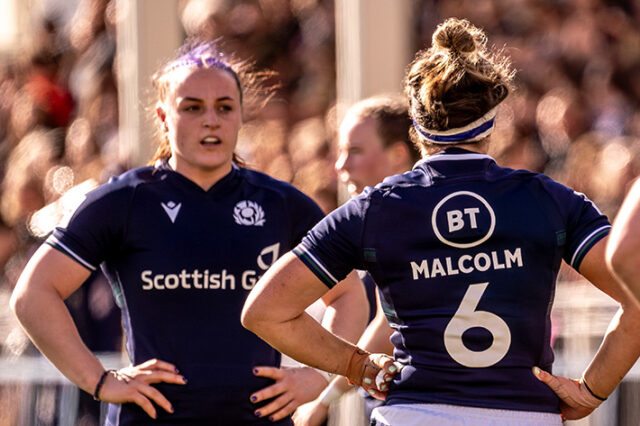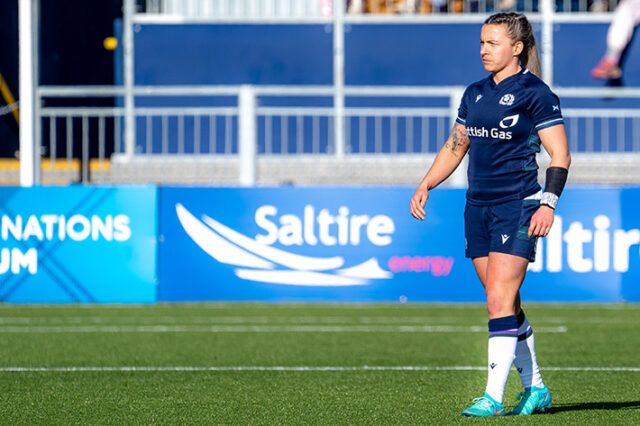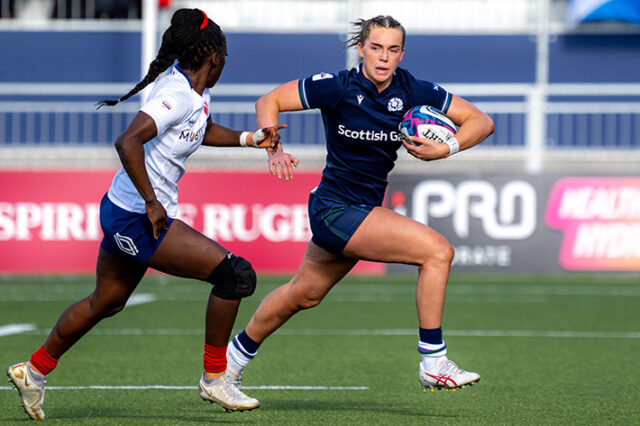By John McLister
The All Blacks are here. No doubt the Scots team is practising hard for their biggest test match of the year. The coach will be analysing video of the men in black; each player will be sizing up his opposite number; and the team will be methodically practising its attack and defence. But the niggling question in the back of every player’s mind is: “How the hell do we deal with the haka?”
The players will probably be told that the best response is to do nothing. This is now the default position for teams facing haka-spouting Kiwis. When the ABs were last here, Scottish Coach Andy Robinson advised: “You face it [the haka], you smile, you deal with it and you get on with the game.” The Kiwi coach of Wales, Warren Gatland, was telling his players that same thing: “You have to front it up and accept the challenge. Are you prepared to accept it; are you going to stand there and face it and show them that you are there? That’s the greatest sign of respect.”
If in any doubt about the ‘silent-and-grin’ approach, the IRB rulebook is clear: you must not advance past the ten-metre line while the haka is being performed. If you do, the IRB will slap you with a fine. This was France’s punishment for gingerly marching hand-in-hand to meet their doom in the World Cup final last year. Of course, this be-a-good-boy-johnny approach will not help you win the psychological battle. It is also plainly wrong.
The IRB and coaches could claim that this policy is the result of being culturally sensitive. But when Maori are consulted, they say the IRB position is at odds with their understanding of the haka. “It’s stupid,” says Malcolm Mulholland, author of ‘Beneath the Māori Moon: An Illustrated History of Māori Rugby’, and authority on Maori in sport. “If you want to move close to the haka, that is your prerogative. It can’t be up to some arbitrary body that probably lacks the cultural understanding to make that kind of decision,” he says.
Mulholland, and a number of other Maori commentators, are insistent that teams should feel free to respond to NZ sides performing a haka. ‘’Maori don’t get sensitive about being challenged in the haka. It something we are pretty used to. If someone gets up and does a haka someone will respond with a haka,” says Hamuera Kahi, a Lecturer in Māori and Indigenous Studies at Canterbury University.
Over the last few decades, Home Nations have tried to respond to the haka. The Irish were one of the first sides to attempt the march on the All Black haka, a plan concocted by then Irish skipper Willie Anderson in the dressing room before the match. English hooker Richard Cockerill famously went head-to-head with his opposite Kiwi number while the haka was in mid performance.
This was all great theatre and appreciated by the fans. Wiri Gardiner, an eminent authority on the Maori customs, and author of the book ‘Haka’ said: “In my view, both Anderson’s and Cockerill’s actions were perfectly acceptable, and were typical of the traditional response to the haka.”
Gardiner, also commenting on the Welsh wanting to sing their national anthem in response to the haka in 2007, said: “From a traditional point of view it is perfectly appropriate for the Welsh to seek a response to the haka”. Unfortunately, the All Blacks refused to comply; and in a huff performed the haka in the dressing room.
This was a major breach of Maori protocol and indicates that the All Blacks’ understanding of the haka can differ from Maori at times. “In a Maori cultural framework the host always set the protocols,” says Kahi. “When we talk about New Zealand doing the haka in the locker room, that is more culturally insensitive than to actually let the Welsh do it their way.” Mulholland confirms this: “I don’t see it denigrating the haka, if that is how the Welsh want to respond that’s fair enough.”
What is clear, is that from a Maori perspective the current IRB policy, and All Black sensitivities, are not in tune with a traditional Maori view of responding to the haka. Being silent and respectful is an IRB directive. Not being able to sing your national anthem in response to the haka is a Richie McCaw and NZRU fabricated myth.
There is therefore nothing to stop Scotland from drawing on its on unique culture to offer a response to the haka. This would not only benefit the players – creating a much needed psychological counter to the All Blacks – but would also benefit the nation.
Mullholand offers this advice from a Maori perspective: “When you look at the haka and what it has done for the All Blacks, and for the country as a whole, you could argue that this is New Zealand’s best known export. Everybody knows the haka and everyone associates it with Maori culture. The spin off from that has been huge. What’s to say that couldn’t occur for the Scots if the bagpipes were to start up a game, or a choir for the Welsh. It’s got to be good for the countries involved.”
Mulholland’s advice to the Scots facing a haka is simple: “Bring it on!” When Scotland faces the All Black haka on Sunday, they should respond in kind: when the haka ends, the pipes should begin to play; and thousands of Scots break into Scots Wha Ha’e. Standing sulky and silent is no legitimate response to the haka. It belittles our players and belittles our culture. Scotland needs to be brave.
That is how the haka is really respected.
John McLister is a Scot living in New Zealand, a mature student at the University of Canterbury in Christchurch, New Zealand ,and is currently also studying journalism with the London School of Journalism.







5 Responses
I know! The Scottish team should stand there as a ‘Braveheart-style’ mob and – in unison with the (at least Scottish) members of the crowd – shake their fists and bawl CLAYMOOOOOOOOORE! Something like that?
Now that would be a traditional response of sorts to the haka (which I love by the way).
:o)
The response should be on the field. Too many teams and too many journalists pay too much attention to the theatre of it. The only way to respectfully respond is to give your all for 80 minutes on the park. Because that is what the All Blacks will give, nothing less.
Completly disagree with Ray. I think the theater of it is wonderfull. To have your national team faced with a haka and then for them to stand sholder to sholder and advance together gave me shivers and made the crowd go wild. Anything than makes fans enjoy rugby, and is respectful (like accepting a challange/haka) should be encouraged as it will only improve the game.
Sure, but standing shoulder to shoulder and watching it is what teams have always done, it is not a response in the way that this article is implying. It is being suggested that there should be some sort of rehearsed response “pipes playing”, etc.
I am a Scot and have lived in NZ for 10 years. Believe me the Kaka has got nothing to do with culture when it comes to rugby. It is a tool used to pump up the team and intimidate the opposition prior to a game. In college rugby in NZ some times it is more about the Hakathan the game as they go nose to nose. It is all about aggression and one of the reasons why NZ has a terrible child abuse record. Ok if the AB’ s want to do it at home then that’s fine but overseas should be by invitation. Why should a team have to stand there and just take it on there home patch. In my opinion it has no place in international rugby. It Xserves a Braveheart turn your back and drop them response at Murrayfield.